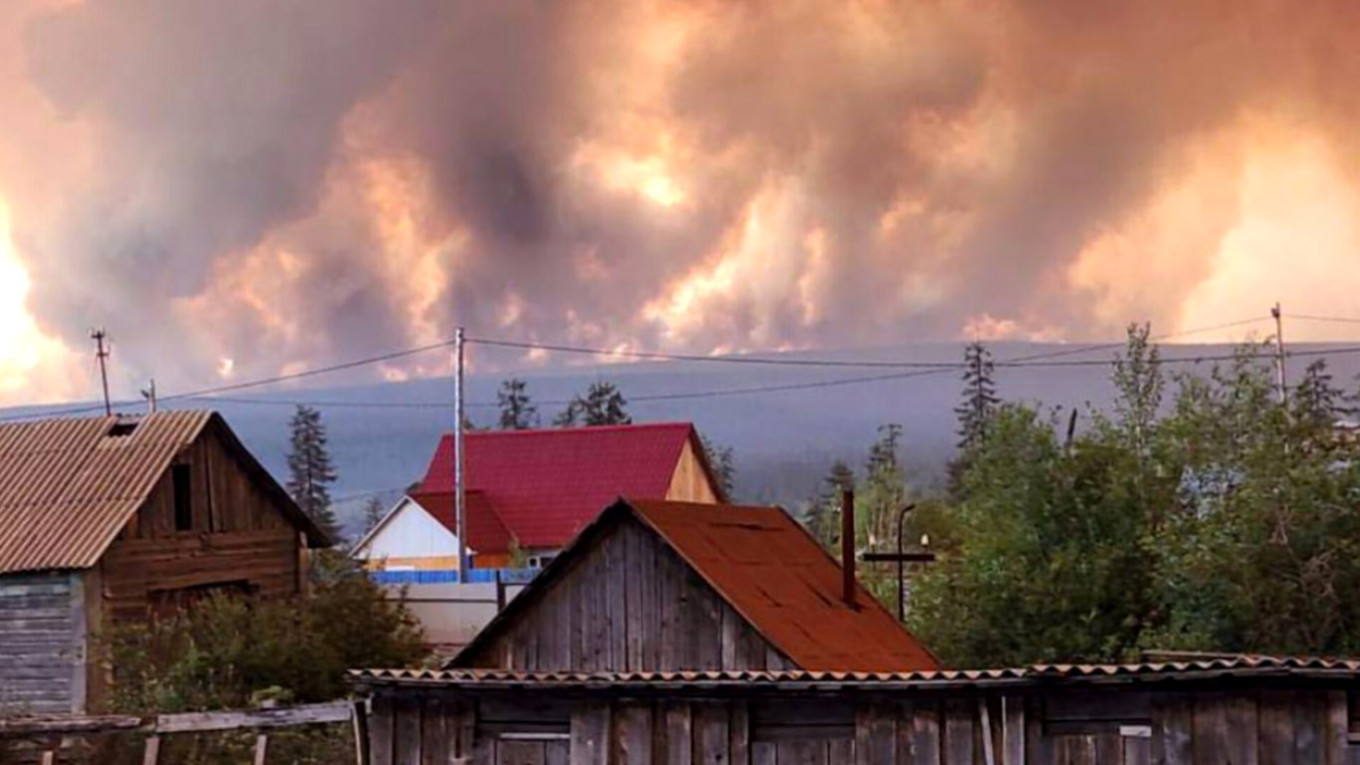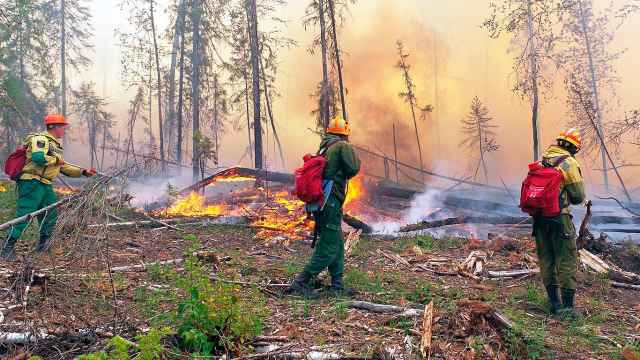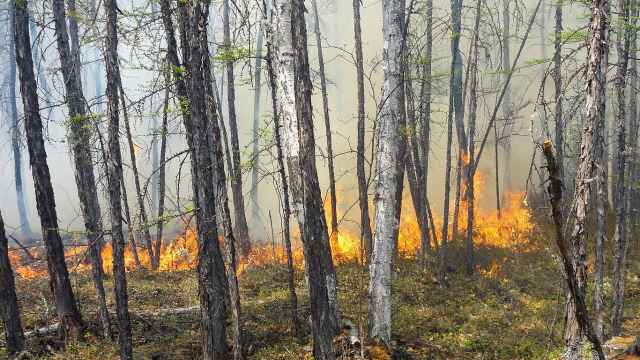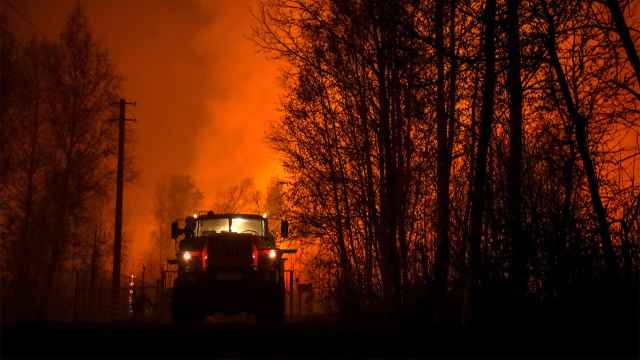Wildfires have destroyed nearly 5 million hectares of forest in Russia so far this summer, the country’s Aerial Forest Protection Service reported Monday.
This figure means that this year’s wildfire season in Russia has already been more devastating than the previous two, which saw 4.6 million hectares and 3.5 million hectares of forest destroyed respectively, according to the environmental news outlet Kedr Media.
The Far East republic of Sakha (Yakutia), a vast region encompassing parts of the Russian Arctic, tops the list of the regions most affected by the ongoing fires.
At least 2 million hectares of forest have been destroyed in the blazes there, while local residents are lamenting the authorities’ lax response to the growing crisis.
“For now, this, of course, seems like nothing when compared to 2021,” said Sargylana Kondakova, co-founder of the region’s largest Indigenous rights group the Free Yakutia Foundation, referring to that year’s record-breaking fires that wiped out more than 18 million hectares of forests across the country.
“But it all started just the same back then: with the authorities’ inaction. Right now, no [fire fighting] equipment is being allocated for the republic [from Moscow],” Kondakova told The Moscow Times.
“[The republic’s head Aysen] Nikolaev claims to have everything under control in his statements, but people on the ground are reporting completely different things,” she added.
An annual occurrence every summer, wildfires across Russia's Siberian and Far East regions have intensified in recent years as climate change has exacerbated the hot, dry conditions in which these fires thrive.
When speaking with The Moscow Times in March, experts and firefighters from Russia sounded the alarm over the country’s grave lack of preparedness for this year’s wildfire season, warning it could turn into a crisis.
Today, it appears that some of their worst fears are becoming a reality.
Experts warn that the official statistics already released by the Russian government does not necessarily reflect the actual scale of fire-inflicted devastation as it fails to account for forest fires on former and current agricultural lands, among others.
And space monitoring data suggests that the total area of natural fires in Russia has already exceeded 8.8 million hectares.
In Sakha, where a wildfire emergency was declared on June 11, forest fires have disproportionately affected isolated rural areas that have neither reliable transportation links with the capital Yakutsk nor internet access.
On Monday, local authorities confirmed the evacuation of two villages in the republic’s Verkhnevilyuysky and Abyysky districts due to heavy smog and the threat of fire destruction.
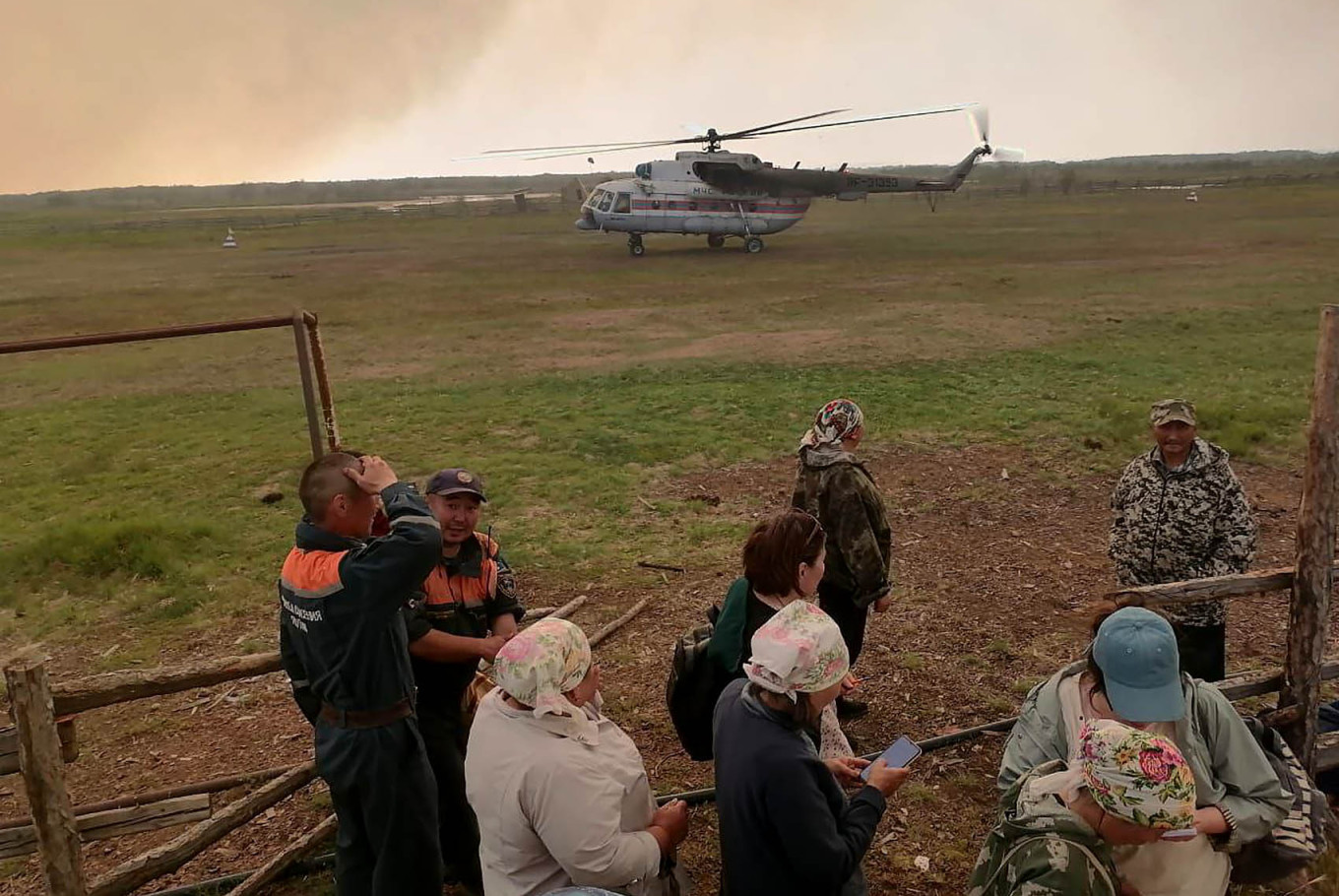
Government officials and media, however, used the term “relocation” when announcing the move in a likely attempt to subside growing discontent among the rural population.
Among these communities is the Evenk village of Tyana, which came into media spotlight earlier this year when its residents campaigned against unchecked gold mining works by the oligarch-owned giant Nordgold.
Last week, Tyana’s residents published a plea for help to the republic’s government, saying they can no longer contain fires that are encroaching onto the village from two sides on their own.
“Only two firefighting instructors were sent here to help and that's it!” said the villagers.
“Our strength is running out! This cannot go on any longer! We need help!” they added.
This cry of desperation prompted some to speculate that the government might intentionally be delaying help to tacitly aid Nordgold’s plans to develop a new gold mine in the area. Proposing gold exploration on burned-down forest areas — as opposed to those protected by national law — could allow Nordgold to secure the project within months, experts say.
But other Yakutian villages are finding themselves in a very similar situation.
“People are mostly extinguishing the fires on their own,” said Kondakova of Free Yakutia. “Now even helicopters seem helpless because they can't land in affected areas due to heavy smoke.”
Kondakova warned that the forest fires are coinciding with the peak of haymaking season in Sakha, forcing many villagers to abandon the process to aid firefighting efforts.
“This means they are preparing for a hungry winter, as the livestock will need to be moved somewhere else,” said Kondakova.
Yet the activist says she has little hope that local authorities led by Nikolayev will step up their efforts in fighting the fires unless faced with the possibility of discontent in the regional capital Yakutsk.
“When central Yakutia was burning in 2021, the entire city of Yakutsk was covered in smoke. Then there was panic among the people because they were suffocating too,” she said.
“But if there is no smoke in Yakutsk, it means there are no fires anywhere — that's the government’s logic.”
A Message from The Moscow Times:
Dear readers,
We are facing unprecedented challenges. Russia's Prosecutor General's Office has designated The Moscow Times as an "undesirable" organization, criminalizing our work and putting our staff at risk of prosecution. This follows our earlier unjust labeling as a "foreign agent."
These actions are direct attempts to silence independent journalism in Russia. The authorities claim our work "discredits the decisions of the Russian leadership." We see things differently: we strive to provide accurate, unbiased reporting on Russia.
We, the journalists of The Moscow Times, refuse to be silenced. But to continue our work, we need your help.
Your support, no matter how small, makes a world of difference. If you can, please support us monthly starting from just $2. It's quick to set up, and every contribution makes a significant impact.
By supporting The Moscow Times, you're defending open, independent journalism in the face of repression. Thank you for standing with us.
Remind me later.



